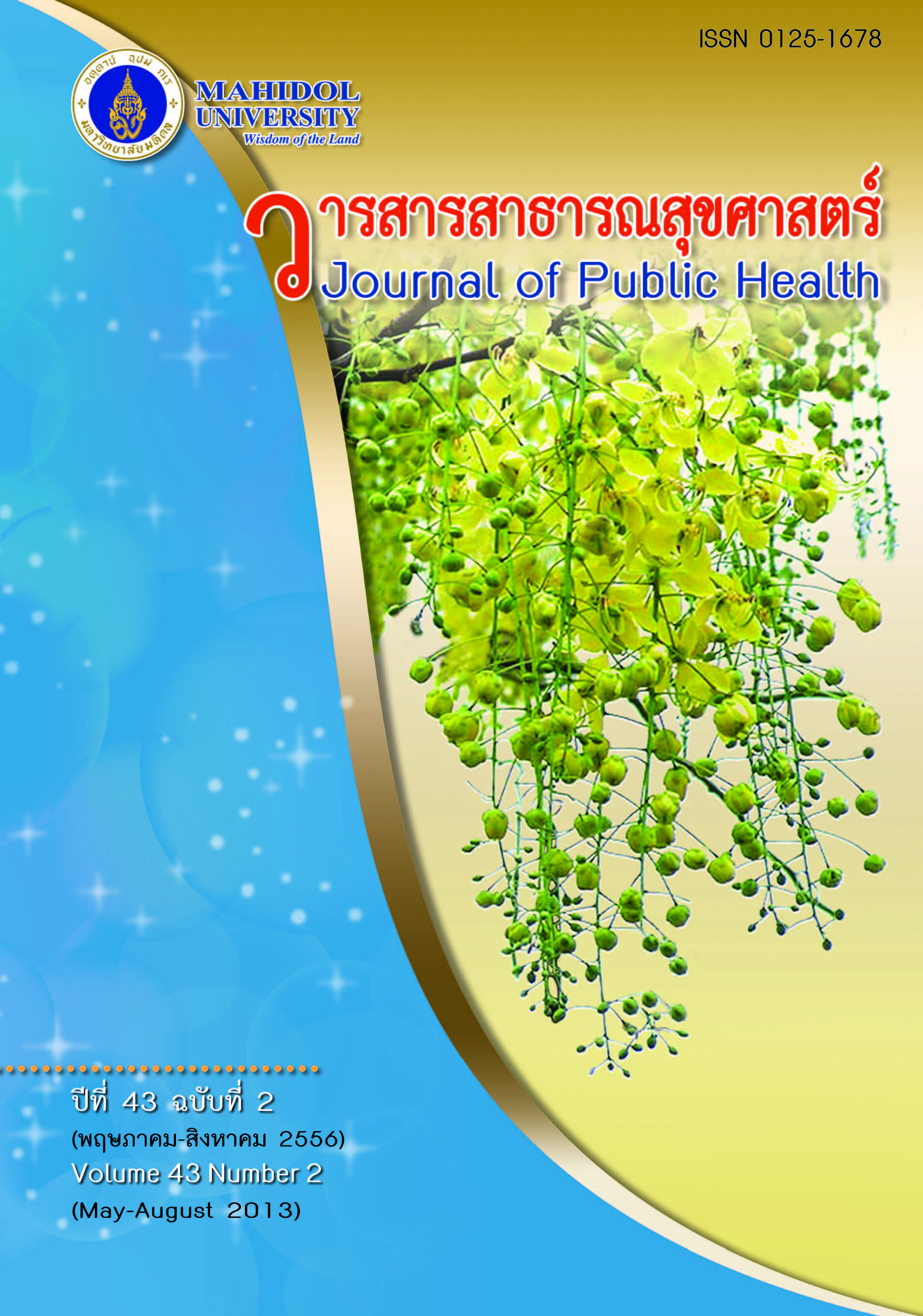การศึกษาสถานการณ์ ระบบ และกระบวนการดำเนินงานสุขาภิบาลอาหารของประเทศไทย
Abstract
บทคัดย่อ
การศึกษาสถานการณ์ ระบบ และกระบวนการดำเนินงานสุขาภิบาลอาหารของประเทศไทย เป็นศึกษาภาคตัดขวาง (Cross-sectional Research) และประเมินผลการดำเนินงาน (Evaluation Research) ของหน่วยราชการส่วนท้องถิ่น เพื่อศึกษาสถานการณ์ กระบวนการ กลวิธีการดำเนินงาน และองค์ประกอบที่มีผลต่อความสำเร็จของการดำเนินงานสุขาภิบาลอาหาร รวบรวม วิเคราะห์และสังเคราะห์ข้อมูลที่ได้จากการสัมภาษณ์เชิงลึกผู้บริหาร (In-depth - Interview) การประชุมกลุ่มเจ้าหน้าที่และเครือข่าย (Focus Group) การประเมินมาตรฐานระบบงานสุขาภิบาลอาหารของหน่วยราชการส่วนท้องถิ่น (SOP) และการสำรวจข้อมูลสถานประกอบการด้านอาหาร (Survey) โดยทำการศึกษาในเทศบาล 10 แห่ง ระหว่างปี พ.ศ. 2553-2554 ผลการศึกษาพบว่า ในทัศนะของผู้บริหาร ปัจจัยที่ส่งผลต่อความสำเร็จได้แก่ นโยบาย กลยุทธ์ แนวทางการดำเนินงานและกิจกรรม ระบบภาคีเครือข่ายช่วยเหลือการทำงาน การตรวจสอบที่เป็นระบบ และการสนับสนุนวัสดุอุปกรณ์/งบประมาณ สำหรับเจ้าหน้าที่ผู้ปฏิบัติงานมีความเห็นว่า ความสำเร็จของงานสุขาภิบาลอาหารประกอบด้วย การมีนโยบายระดับชาติ (National Policy) การมีแผนงาน/โครงการและเป้าหมายของงานอย่างชัดเจน ทุกภาคส่วนที่เกี่ยวข้องต้องให้ความร่วมมือและสนับสนุนการดำเนินงาน ในส่วนของผู้ประกอบการด้านอาหาร พบว่า มีความพึงพอใจและความคาดหวังสูงต่อการปฏิบัติงานของเจ้าหน้าที่และภาคีที่เกี่ยวข้อง ในส่วนชมรมผู้ประกอบการค้าอาหารพบว่า ชมรมฯ ต้องมีความเข้มแข็งและร่วมสนับสนุนการดำเนินงาน ให้ความร่วมมือทำงานกับเจ้าหน้าที่ ต้องการให้ภาครัฐมีระบบการเฝ้าระวังฯที่มีคุณภาพ มีระบบการให้ความรู้และพัฒนาหลายช่องทาง ในการประเมินระบบมาตรฐานการดำเนินงาน (SOP) พบว่าส่วนใหญ่ผ่านอยู่ในเกณฑ์ขั้นปานกลางถึงก้าวหน้า สามารถดำเนินงานตามกระบวนการมาตรฐานที่กำหนดได้อย่างมีประสิทธิภาพ มีหลักฐานอ้างอิง และตรวจสอบได้ ผลการประเมินสถานประกอบการฯ พบว่าส่วนใหญ่ได้มาตรฐานสุขาภิบาลอาหารของกรมอนามัย
A Study of the Present Situation, System and Standard Operationing Procedure (SOP) of Food Sanitation in Thailand
ABSTRACT
A study of the present situation, system and standard operationing procedure (SOP) of food sanitation in Thailand was conducted in 10 municipalities around the country. The study aimed to determine the present situation, key success factors, composition of the SOP, and prominent features for successful operation of food sanitation activities in local government areas. Cross-sectional research methods and evaluation of working performance were used in this study. The data were collected by in-depth interviews of executive administrators, focus groups of local authorities and networks, and questionnaires and food sanitation surveys completed by proprietors, food service associations, and consumers. The results from 10 municipalities showed that important key factors were national food safety policy and strategies, the management system, operational and budget plans, acceptable implementation, and management of partnership networks (for example, food service associations, proprietors and consumers). Additionally, strength of officers’ and networks’ cooperation, capacity building of the local officers and networks, and improvement by local authorities to enforce existing public health law and regulation also played an important role in successful and sustainable food sanitation management. Finally, public relations, the food sanitation surveillance system, food safety quality control system, and development of associated networks are required to effectively achieve the goal of food sanitation in Thailand. The evaluation of SOP performance revealed that all municipalities have effectively achieved the standard at medium to advance levels. Regarding food sanitation surveys, it was found that most food services met the food sanitation standard required by the Department of Health.
Downloads
Issue
Section
License
Creative Commons License CC-BY-ND


